 Petzlover
Petzlover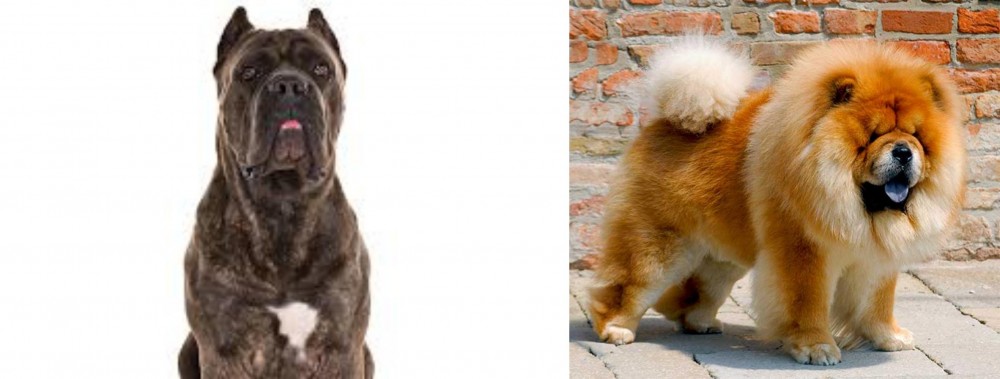 Cane Corso is originated from Italy but Chow Chow is originated from China. Cane Corso may grow 19 cm / 8 inches higher than Chow Chow. Cane Corso may weigh 18 kg / 40 pounds more than Chow Chow. Both Cane Corso and Chow Chow has almost same life span. Both Cane Corso and Chow Chow has almost same litter size. Cane Corso requires Moderate Maintenance. But Chow Chow requires High Maintenance
Cane Corso is originated from Italy but Chow Chow is originated from China. Cane Corso may grow 19 cm / 8 inches higher than Chow Chow. Cane Corso may weigh 18 kg / 40 pounds more than Chow Chow. Both Cane Corso and Chow Chow has almost same life span. Both Cane Corso and Chow Chow has almost same litter size. Cane Corso requires Moderate Maintenance. But Chow Chow requires High Maintenance
 As a descendant of the Canis pugnax, the Cane Corso dog which hails from Italy has been used for guarding livestock and property. The Corso’s lineage goes far back to ancient Roman times, with the name of dog actually meaning bodyguard dog.
As a descendant of the Canis pugnax, the Cane Corso dog which hails from Italy has been used for guarding livestock and property. The Corso’s lineage goes far back to ancient Roman times, with the name of dog actually meaning bodyguard dog.
As life changed in Italy, the Corso became more rare so that some enthusiasts of the breed began to look at helping the dog recover from the brink of extinction. By 1994, the breed was accepted by the Italian Kennel Club and the dog was also recognized internationally, with the American Kennel Club recognizing the Cane Corso in 2010.
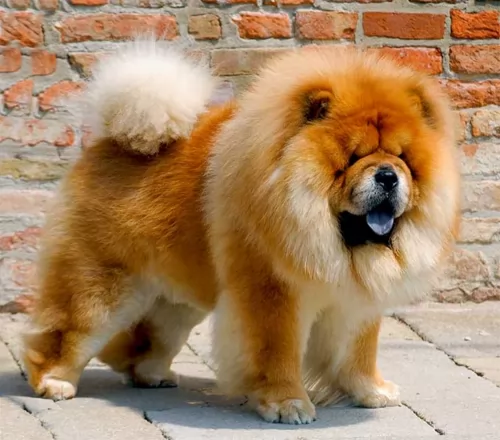 Northern China is the original home of the Chow Chow. In that region of China, the breed was known as the Songshi Quan – “the puffy-lion” dog. They have also been known in China as the “Dog of the Tang Empire” or the Tang Quan. The Chow is believed to be an ancient breed that the Foo Dog, or stone dog guardians of Buddhist palaces and temples, is modeled after. It is one of the most ancient of dog breeds that are still around today.
Northern China is the original home of the Chow Chow. In that region of China, the breed was known as the Songshi Quan – “the puffy-lion” dog. They have also been known in China as the “Dog of the Tang Empire” or the Tang Quan. The Chow is believed to be an ancient breed that the Foo Dog, or stone dog guardians of Buddhist palaces and temples, is modeled after. It is one of the most ancient of dog breeds that are still around today.
It is believed that they have existed for around 2000 years or perhaps even as far back as 3000 years, starting out in Mongolia and migrating to China. The ancientness of the Chow Chow has been validated through DNA testing. In China all those centuries ago, the Chow Chow was born to be a working dog. They hunted, herded, guarded and pulled carts. They went on quests with the Mongolian armies when China was invaded, as well as when the Mongolians invaded the Middle East and Europe later on.
Today’s Canadian Kennel Club has about 350 Chows registered while the AKC gets 10,000 new registrations every year.
 The Cane Corso is a large dog which hails from Italy. He is a molosser. The dog is muscled and is somewhat less bulkier than other Mastiff breeds. He is 64-70 cm in height and he weighs 45-50 kg.
The Cane Corso is a large dog which hails from Italy. He is a molosser. The dog is muscled and is somewhat less bulkier than other Mastiff breeds. He is 64-70 cm in height and he weighs 45-50 kg.
The head of the Cane Corso is large and the ears are cropped and stand erect. The tail is also traditionally docked to give the dog a distinctive look, but these days, with regulations regarding tail docking, the dog can also be seen with a full tail.
The Corso has a short coat which comes in fawn shades, gray, red, brindle or black shades. White markings are common on the chest, chin, toes and sometimes on the nose.
The Corso is a working dog who needs lots of mental and physical stimulation. He’s an inquisitive dog who is confident and ready to meet life as it comes. He’ll want a strong, firm owner with leadership qualities. He'll require training and socialization and then he becomes an affectionate, obedient pet who gets on well with all members of the family as well as other pets. He is a highly intelligent dog and responds well to training.
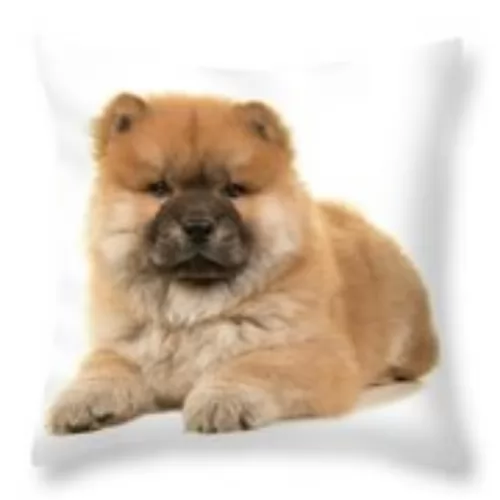 The Chow really does look like a small lion with a black tongue. The dog is sturdy and square with erect, small ears on a broad skull. They have a very dense double coat. Their eyes are deep set and look like almonds, while they all have that very distinctive purple or black tongue. Their lips are also distinctive with their blue color. The nose is black, but some Chows might have a blue nose. The tail is curly.
The Chow really does look like a small lion with a black tongue. The dog is sturdy and square with erect, small ears on a broad skull. They have a very dense double coat. Their eyes are deep set and look like almonds, while they all have that very distinctive purple or black tongue. Their lips are also distinctive with their blue color. The nose is black, but some Chows might have a blue nose. The tail is curly.
These are medium size dogs when it comes to height and weight, but they are powerfully built for their size. Their power is in their compact body holding the energy and strength of a much larger dog. Its hind legs are almost entirely straight, unusual for any dog. They get their lion appearance from the huge ruff that stands behind their heads. Their chest is broad and deep.
 The Cane Corso is known for his agility and athleticism. He is full of energy and he also wants lots of attention and companionship from his human family. With proper training and socialization his temperament changes so that he becomes a super friend and companion while also being protective.
The Cane Corso is known for his agility and athleticism. He is full of energy and he also wants lots of attention and companionship from his human family. With proper training and socialization his temperament changes so that he becomes a super friend and companion while also being protective.
The dog is attentive and receptive to training. The way a dog turns out is essentially what the owners are like, and many Cane Corso dogs have been blamed for being aggressive because they’ve been brought up by aggressive, abusive and irresponsible owners.
The Cane Corso is a large dog with an exuberant nature and who expresses his joy by snorting, wheezing, grunting and slobbering. Treat him well as a family member and you’re going to have a wonderful friend and protector.
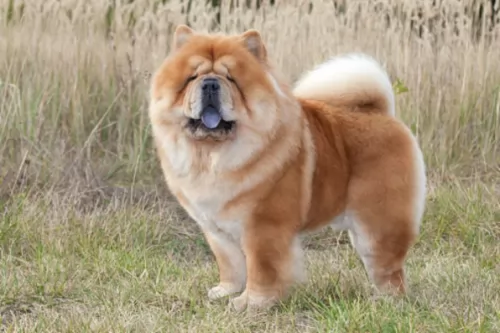 Loyal and true to their family and those they know; the Chow Chow is a little standoffish with strangers. They are very protective and usually attach themselves to one or two people. They are intelligent but stubborn, which can affect your training with them. They need to respect their people and Chows respect hose who take care of them. They can be aggressive toward dogs of their same sex especially if those dogs are the same breed as well.
Loyal and true to their family and those they know; the Chow Chow is a little standoffish with strangers. They are very protective and usually attach themselves to one or two people. They are intelligent but stubborn, which can affect your training with them. They need to respect their people and Chows respect hose who take care of them. They can be aggressive toward dogs of their same sex especially if those dogs are the same breed as well.
They are known to be very clean and many have compared them to cats in that regard. They appear to be dignified and refined. They are usually very quiet but very adaptable dogs.
 The life expectancy of the Cane Corso is 10 to 12 years. He is a large, healthy dog breed, but all large dogs are inclined towards bone and joint problems which includes hip dysplasia. Your Cane Corso is also prone to eye defects.
The life expectancy of the Cane Corso is 10 to 12 years. He is a large, healthy dog breed, but all large dogs are inclined towards bone and joint problems which includes hip dysplasia. Your Cane Corso is also prone to eye defects.
Strangely, dogs have 3 eyelids, with the third eyelid being home to tear producing gland. There are some dogs where the ligament fails so that the gland pops out, looking like a cherry stuck at the inner corner of the eye. The veterinarian will be able to perform surgery to attach the gland back.
There are dogs where the eyelids roll inwards. Entropion causes hair to rub on the surface of the eye, resulting in pain and also damage to the cornea. Sometimes surgery will be necessary to fix the eyelid.
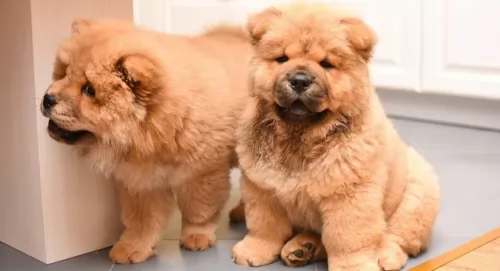 Although an ancient breed that obviously has survived many centuries of trials, the Cho Chow of today is prone to several different health conditions. These include:
Although an ancient breed that obviously has survived many centuries of trials, the Cho Chow of today is prone to several different health conditions. These include:
This condition can require surgery to keep the turning eyelid from injuring the eye ball.
This can cause lameness and arthritis.
This can cause lameness and arthritis.
Make sure you keep the ears clean and keep an eye on them.
 The short coat sheds fairly heavily twice a year. His coat will certainly need a brush twice a week but during shedding time it will be more often if you want to avoid your home being full of hair. As you brush, its the chance to check for fleas, ticks and skin infections.
The short coat sheds fairly heavily twice a year. His coat will certainly need a brush twice a week but during shedding time it will be more often if you want to avoid your home being full of hair. As you brush, its the chance to check for fleas, ticks and skin infections.
Brush your Cane Corso’s teeth at least 2 or 3 times a week to remove tartar build-up. If you don’t there is the problem of bacteria which can result in gum disease, bad breath and tooth loss.
Your Cane Corso is a large, active dog and will therefore require a high quality food for his breed type. The type of food your dog eats will depend on his age and his activity levels.
The quality of dog food is highly important as it is a contributing factor towards his health. Always try to give your dog some home-made food such as vegetables, rice and meat. Include some raw meat into his diet from time to time as a dog is a carnivore, and raw meat in his diet will help to stave off skin problems. Never forget to check that he has fresh, cool water around the clock.
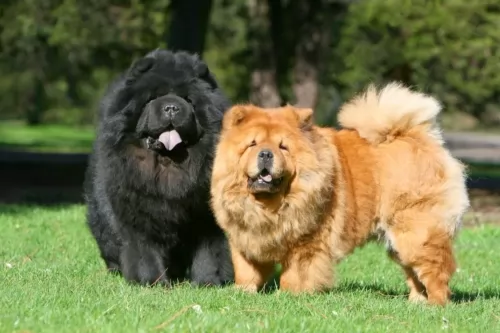 Don’t overfeed a Chow Chow as they are hard workers and big eaters. Feed them at least twice a day.
Don’t overfeed a Chow Chow as they are hard workers and big eaters. Feed them at least twice a day.
This eye disease can lead to blindness if not checked and treated.
These can be removed from an adolescent puppy.
Again, the Chow is susceptible to cancer.
Can lead to heart or kidney problems if left untreated.
Keep a close eye on your Chow Chow skin.
The Chow Chow was developed as working dog, but today’s version is more laid back and doesn’t need excessive exercise. Daily walks will suffice. They live very happily in the city if walked regularly. They are not really a competitive breed outside of obedience and confirmation. They are seldom seen in sports like agility or frisbee.